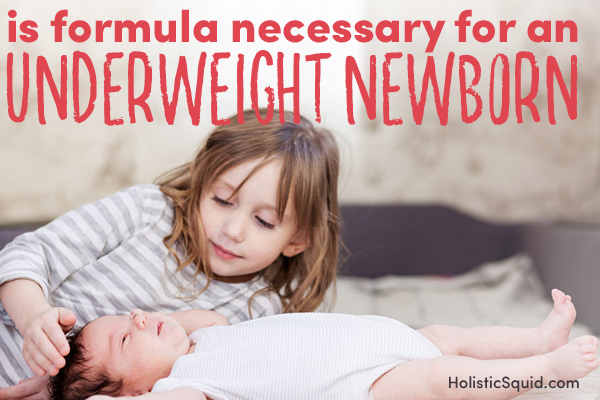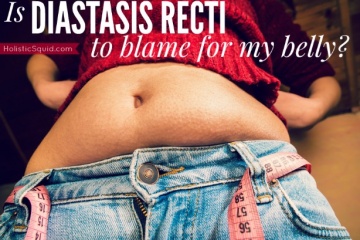
If you're about to supplement with formula because your newborn's weight doesn't meet chart guidelines or your pediatrician's expectations, take a step back to consider the big picture first.
First of all – and I apologize in advance that this statement will not be popular with many moms who bottle feed – formula is simply not an equivalent substitute for breast milk. The decision to use this ultra-processed ‘food' should not be taken lightly.
Commercial formula should only be used as an emergency option or if a baby can absolutely not be exclusively breastfed (women with HIV should not breastfeed at all). In the latter cases, consider that there are far better options than commercial formula for those willing to make the extra effort.
Secondly, the amount of weight a baby loses in the first few days may not be an appropriate gauge to determine whether or not a baby is thriving, despite the fact that many pediatricians use weight loss as a red flag that pushes new parents into giving their newborn formula.
There are two main reasons that healthy, thriving babies may lose weight or fail to meet a chart's criteria for weight gains.
Medical interventions bump up birth weight
Mothers who receive pitocin, epidurals, and/or IV fluids tend to have newborns who lose more than the “usual” amount of birth weight in the first 24 to 72 hours.
Pitocin is an anti-diuretic, which means it causes the body to hold onto fluids. Mothers given epidurals are first pre-loaded with IV fluids to reduce the likelihood of emergent drop in blood pressure.
The increased water retention of the mamas causes many babies to be born “heavier,” so weight loss often reflects self-regulation after over-hydration. Even without these interventions, slightly higher weight could also be recorded if your baby is weighed before she pees for the first time.
Guidelines are not hard, fast rules
Most pediatricians consider ‘standard' weight loss of breastfed babies to be 7-10%, and they want to see baby back to birth weight by days 10-14 of life. It's important to remember, however, that these percentages are just guidelines, not gospel.
Whether or not you had interventions at your birth, every baby and mama is different.
With both of my home birth babies, I was told by my pediatrician that they had lost too much weight two days after birth, they weren't latching properly on the breast, and I would need to supplement with formula.
The first time, I was a brand-new mom, and I felt relief that there was a ‘solution' so I could better care for my crying baby. We supplemented with Earth's Best Organic milk-based formula for two days, and after much hard work pumping and perseverance with nursing, my son was then exclusively breastfed until he started solids.
While he has always been quite robust and healthy, he did experience a dairy intolerance (even for raw milk) in his first three years.
With my second baby, I wasn't so quick to jump on the supplemental formula train. Though my daughter had lost more weight than ‘normal', I chose to focus on the breastfeeding instead of pumping and supplementing. I monitored her weight from home. Low and behold, she caught up in less than one week.
Now 14 months old, she is plump and developing on target. She tolerates most foods – including raw dairy – with ease.
Three things you can do to avoid unnecessary formula:
#1 – Wait to weigh
It actually makes sense to measure weight gain from when baby stops losing weight (about 3-5 days after birth) rather than from baby's birth weight. Talk to your pediatrician about implementing this plan.
#2 – Look at baby, not the scale
As long as baby is peeing enough (1 wet diaper day 1, 2 wet diapers day 2, and 6-8 times a day by the time milk comes in), baby is most likely hydrated and weight loss is generally okay. (source)
Look for other signs of adequate hydration: the skin of baby's lips is full and without creases; baby's fontanelles (soft spots of the skull) should be flat, not sunken; and baby should not be peeing crystals.
Sometimes it can be hard to tell if a diaper is wet. If you're worried baby's not peeing, try pouring one ounce of liquid on a diaper to see how little that really is. Or place a piece of toilet paper in baby's diaper to see if it is getting wet.
#3 – Get support
Before you supplement breast feeding with bottles of formula, consider that colostrum is all a baby needs until your milk comes in – which takes anywhere from 2-5 days post partum or sometimes even up to a week.
This is how mother nature designed us humans (and all mammals for that matter).
If you try to hand-express and only get out a drop or nothing, that's okay. Babies have marble-sized tummies for the first week. They can't even drink an ounce at once, so don't worry about supply in the early days. Just keep baby on the breast.
Instead of rushing into supplementing with formula, call the La Leche League or a trained lactation consultant to make sure you and your baby are doing everything right in the breastfeeding department.
If you need to supplement, read this post to find out whether breast is always best which outlines your options, best to worst.
Were you advised to give your underweight newborn formula?












Great post, just getting acquainted with your site. Love your part about not paying attention to the scale, wish more people would do this later on in their life.
Great posts! Supplementing shouldn’t be considered lightly! Just to elaborate though, I’d like to add a few things.
First according to the World Health Organization, HIV+ mothers in third world countries where access to clean water, sanitary living conditions and the ability to buy formula, breastfeeding is recommending as risks are lower than dying from formula feeding. It’s debated how much HIV is transmittable by nursing but since it is a possibility, mothers is industrialized countries are better off bottle feeding. They however could look into donor milk- either from a formal milk bank or informal milk sharing via Eats on Feets or Human Milk For Human Babies.
Any supplementing that does occur could be done with mom’s own pumped milk or donor milk before considering formula. The supplement can also be given with a SNS or LactAid device which attaches to the breast to deliver the extra milk while baby is nursing to avoid nipple confusion. I think you mentioned this in another post so just reiterating it here:)